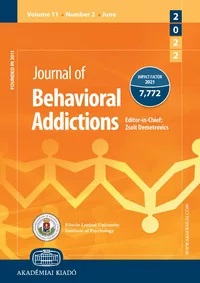Problem gaming-related harm experienced by partners and parents of individuals with gaming problems and their help-seeking experiences
Problem gaming-related harm experienced by partners and parents of individuals with gaming problems and their help-seeking experiences
Author(s): Carolin SZÁSZ-JANOCHA, Michaela Magann, Hannah Gold, Katajun LINDENBERG, Paul H. Delfabbro, Daniel L. KingSubject(s): Behaviorism
Published by: Akadémiai Kiadó
Keywords: gaming disorder; harm; parents; partners; help-seeking; treatment
Summary/Abstract: Background and aims. Limited research has investigated how individuals' problem gaming affects significant others. The present study investigated the extent to which partners and parents were personally affected by their partner or child's problematic gaming behavior and what steps, if any, were taken in relation to treatment and other help-seeking by the gamers and the respondents themselves. Methods. Two targeted samples (parents, n = 104; partners, n = 264) in Australia were recruited and administered an online survey. The survey assessed gaming-related harm across multiple domains, including financial, relationship, emotional wellbeing, physical health and work/study. Treatment and help-seeking questions referred to seeking psychological assistance, self-help, and community support. Non-parametric tests compared groups on harm measures based on GD status. Results. Parents and partners of individuals rated in the ‘problem gaming’ range reported significantly greater harms compared to those in the at-risk and non-problem categories. The most frequently endorsed harms were in the relationship domain, including neglected household responsibilities, withdrawal from social events, and relationship conflict. Some parents consult with friends and family (15%) to resolve their child's gaming-related problems. Partners reported to seek outside support and assistance for themselves, including 30% who sought a psychologist. No partners reported having consulted a psychologist for their gaming partner. Discussion. Problem gaming affects significant others across multiple life areas, but few seek outside help or support, suggesting there may be significant unmet needs. Conclusions. Further research should examine factors that influence acceptance and engagement with problem gaming help options. Harm indicators may be useful for evaluating targeted interventions and other measures to reduce problem gaming.
Journal: Journal of Behavioral Addictions
- Issue Year: 12/2023
- Issue No: 1
- Page Range: 137-147
- Page Count: 11
- Language: English

